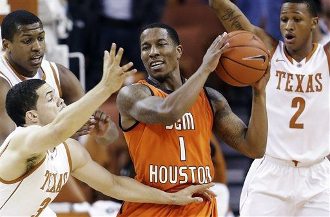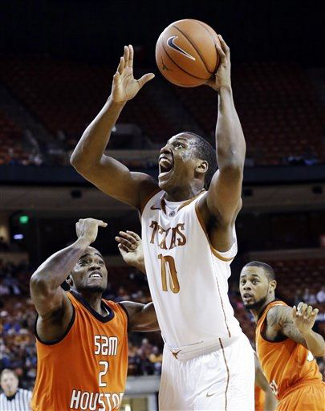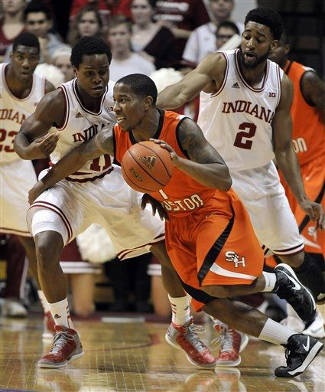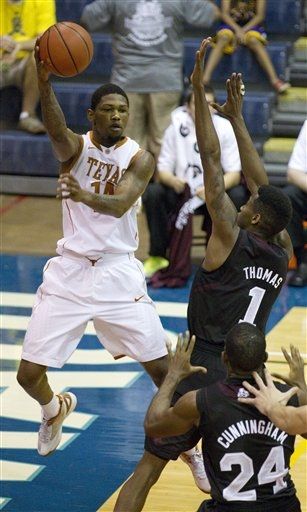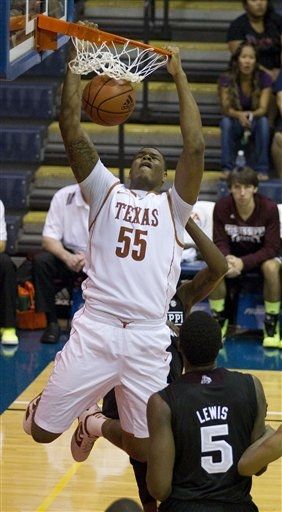Frank Erwin Center | Austin, TX | Tip: 3 P.M. CT | TV: Longhorn Network LRT Consecutive Game #227 The Texas Longhorns used stifling defense to earn a comfortable win over Sam Houston State on Tuesday night. This afternoon, they face a UT-Arlington team with a stingy defense of its own. While the Maverick defense is ranked fifth in Division I in effective field goal percentage, the Longhorn defense is tops in the nation in that category. Throw in the problems that both offenses have had hanging on to the ball this season, and fans could be in store for an ugly, low scoring affair this afternoon at the Erwin Center. Meet the Mavericks Junior point guard Shaquille White-Miller (No. 12) is listed at a generous 5’9″, but he holds his own despite the size disadvantage. In his first full season as a starter, White-Miller is still suffering from some growing pains, turning it over as many times as he’s dished out dimes. His shooting from the floor has been a rough 25%, making it even easier for opposing defenses to sag off and take away driving and passing lanes. Fellow junior Brandon Edwards (No. 35) is a 6’6″ forward who really scraps inside for every loose ball and rebound. He performed admirably in the home opener against a bigger Oklahoma team, and is currently second on the team with nearly eight boards per game. The big man in the middle is 6’10” senior Jordan Reves (No. 55), who is tops on the team with 12.3 rebounds per contest. UTA loves to feed the big man in the post, where he’s knocking down more than 53% of his shots. Against the likes of OU’s Romero Osby, Reves was frustrated early and struggled on both ends of the floor. If he can get comfortable against Texas, he can make a big impact. But, if Prince Ibeh and Cameron Ridley can set the tone early, it could take him out of the game. Although the Mavs don’t take very many shots from behind the arc, the team’s top long-range threat is Polish product Karol Gruszecki (No. 33). Gruszecki came to UTA via North Platte CC, and is currently knocking down his threes at a 40% clip. The final member of the starting five is Kevin Butler (No. 24), who started the first two games of the season on the bench. Butler is a very strong 6’5″ forward who has driving ability and can finish through contact. Last year, he led the Mavericks with 12 points in their game against the Longhorns, and he’s currently the team’s leading scorer with 10.8 points per game this year. Butler is a very tough matchup for opponents, because the smaller UTA lineup usually dictates that he is defended by a 4. His speed and driving ability usually tilt that pairing in his favor, while his strength makes it risky for opponents to throw a smaller defender at him. The player Butler replaced in the starting lineup is guard Jamel Outler (No. 3), a 6’2″ sophomore who transferred from Texas Tech. Despite being moved to a sixth-man role, he’s still fourth on the team with 8.8 points per game. Like Gruszecki, he’s a dangerous long-range shooter, but doesn’t take a ton of shots from behind the arc. Outler averages less than five three-point attempts per game, and has hit nearly 37% of those shots. Junior forward Greg Gainey (No. 21) has already shown a nice, well-rounded game in his minutes off the bench. At 6’5″, he has the strength to score inside against bigger opponents, but has a nice midrange J that can stretch things out a bit. Another JUCO product, Gainey arrived in Arlington via South Plains College and has made a quick impact, averaging 7.8 points per game as a reserve. Freshman guard Drew Charles (No. 4) is the backup point guard, but he has had some issues with ball control this season. In the Oklahoma game, the Sooner pressure forced him to travel on two consecutive possessions while trying to turn up court after receiving the outlet pass. He finished that game with six turnovers, but has managed to only cough it up two more times in the team’s other three games. The final player in the UTA rotation is senior guard Cameron Catlett (No. 25), who played fourteen minutes against North Texas on Wednesday night after missing the first three games of the season. Last year, Catlett started the game against Texas and scored six points in 21 minutes of action. Keys to the game 1) Force Maverick mistakes – While it’s hard to believe, UT-Arlington actually turns the ball over almost as often as Texas does. The Mavericks end 26.9% of their possessions with a miscue, and looked absolutely lost at times against Oklahoma’s backcourt pressure. Texas hasn’t forced many turnovers this season, but a little bit of additional defensive pressure could give the Horns some extra possessions this afternoon. 2) Don’t give it right back – Extra possessions are meaningless if the Longhorns turn around and give the ball back on the other end. UTA made a very nice comeback against Oklahoma by throwing full-court looks at the Sooners, so the Longhorns will have to be ready for that. Texas struggled when Sam Houston State brought backcourt pressure late in Tuesday’s game, so it is definitely an area for concern. All of this focuses simply on bringing the ball up the court, which is unfortunately only half the battle for Texas. Lazy passes and bad angles have led to numerous turnovers when just trying to start the offense at the top of the key, so Javan Felix and his fellow Horns need to focus and take care of the ball in their half-court sets, as well. 3) Get to the line – Texas took advantage of Sam Houston State’s aggressive defense and made it to the line 38 times in Tuesday’s win. The Horns posted an incredible free-throw rate of 88.4% in that game, meaning that they took almost nine free throws for every ten field goal attempts. Fortunately for Texas, the Mavericks also tend to send their opponents to the charity stripe, as they are ranked 306th in Division I with a defensive free-throw rate of 47.6%. If Texas is aggressive against this UTA defense, they should earn numerous opportunities for free points at the line. |








